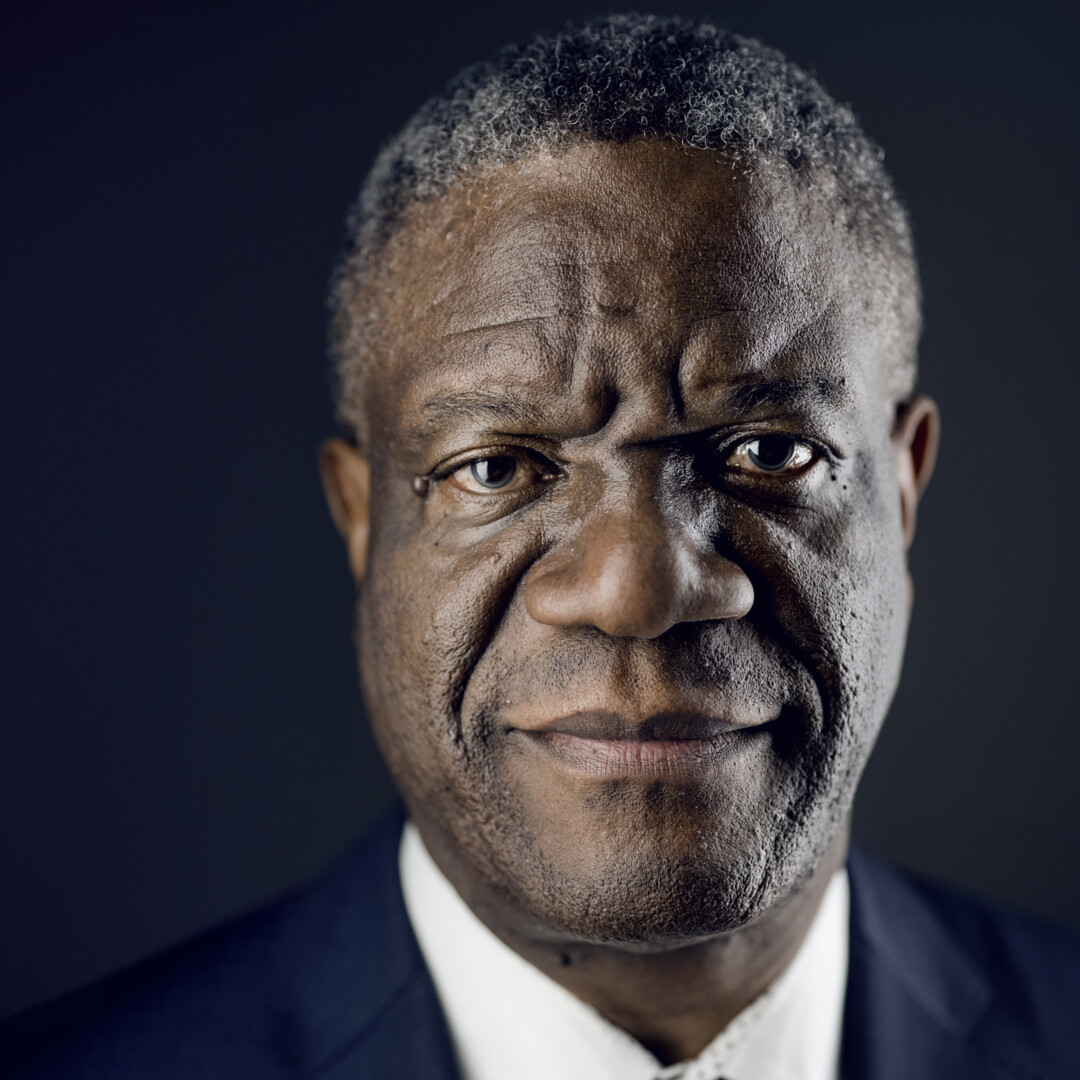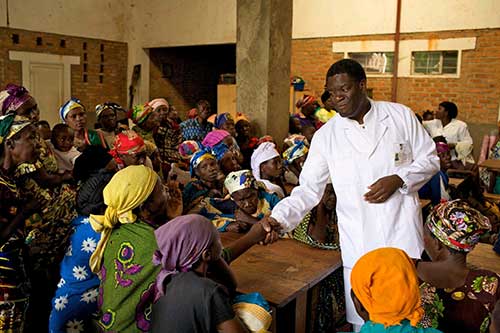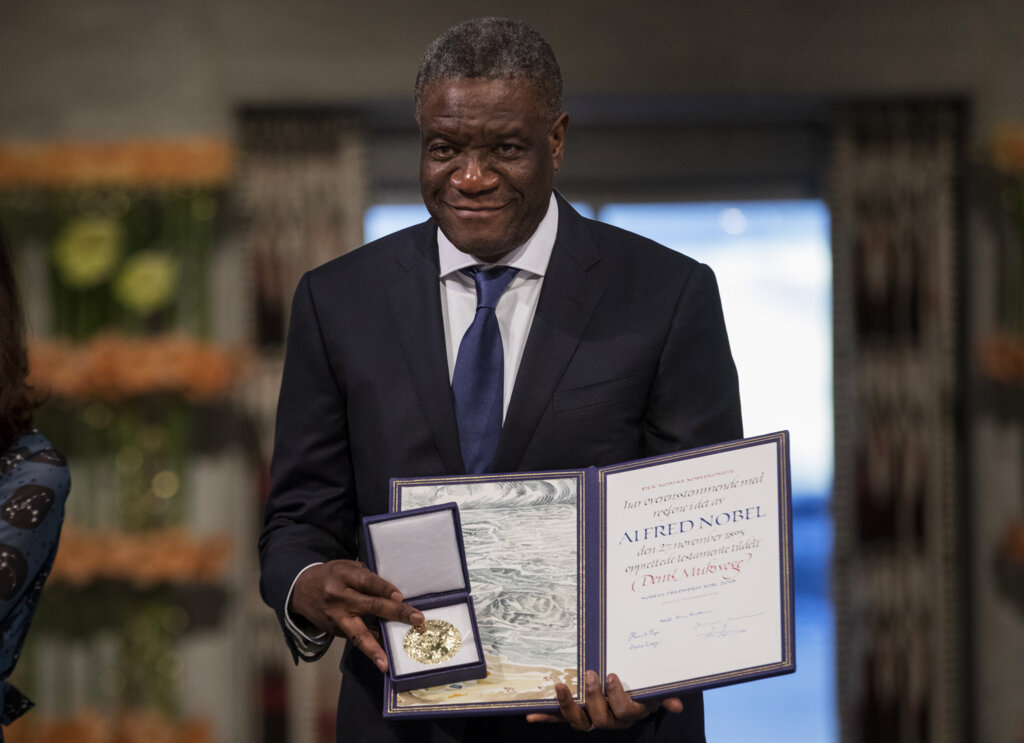Denis Mukwege
Speed read
Denis Mukwege was awarded the Nobel Peace Prize, jointly with Nadia Murad, for his efforts to end the use of sexual violence as a weapon of war and armed conflict.

Full name: Denis Mukwege
Born: 1 March 1955, Bukavu, Belgian Congo (now Democratic Republic of the Congo)
Date awarded: 5 October 2018
The helper
As a boy, Denis Mukwege accompanied his father, a priest, on hospital visits. Wanting to help the patients, he decided to become a doctor. After studying abroad and working as an obstetrician in rural DR Congo, he started a gynaecological service in Lemera in 1989. Civil war came to the village in 1996. The hospital was attacked, and patients killed. War ravaged the country for years. Violence towards civilians was widespread, and rape was used as a weapon routinely and brutally. In 1999, Mukwege opened Panzi Hospital, where he works as chief surgeon. Despite an attempt on his life, Mukwege continues to be a powerful advocate for the end of violence against women in DR Congo and the conviction of the perpetrators.
"When I see some of the injuries on the women and children, I realize this type of violence has little to do with sex and much more with power through a sort of terrorism."
- Denis Mukwege, interview with Warspace and The Guardian, 22 May 2015.
Mukwege’s hospital
Panzi Hospital in Bukavu, DR Congo, treats victims of sexual violence. The original aim was to provide obstetric care to local women, but the focus gradually changed as the hospital admitted more and more victims of sexual abuse. Patients range from babies to grandmothers, many with devastating injuries. In addition to physical care, they receive therapy and legal aid. The hospital admits hundreds of patients every month and Mukwege sometimes has to perform ten operations a day. Mukwege lives at the hospital and his working day can last up to 18 hours. Despite strong international support, the hospital still lacks money, equipment and staff.

War on women’s bodies
Sexual violence has been used strategically in countless wars and armed conflicts since the dawn of time. The systematic use of sexual violence has been documented in conflicts in DR Congo, Iraq, Colombia, Sudan, the former Yugoslavia, Rwanda, Liberia and Afghanistan. Rape, forced prostitution and forced pregnancy are used to achieve political ends, such as ethnic cleansing and the destruction of local communities. The 2018 Nobel Peace Prize underlines that sexual violence can be put on the same footing as other weapons of mass destruction, such as chemical weapons and cluster bombs.
Rape as a war crime
Since 2000, the UN Security Council has passed eight resolutions on women, peace and security. Each underlined that sexual violence constitutes a war crime. Resolution 1820 equates sexual violence with other weapons of war. Both national and international courts can prosecute war crimes. However, not all governments take this responsibility seriously, and many fail to investigate serious misconduct. In recent decades, therefore, the role played by the International Criminal Court has become increasingly important. Both Mukwege and Murad are campaigning for abusers to be brought to justice.

From the Norwegian Nobel Committee’s announcement
Denis Mukwege is the foremost, most unifying symbol, both nationally and internationally, of the struggle to end sexual violence in war and armed conflicts. His basic principle is that “justice is everyone’s business”. Men and women, officers and soldiers, and local, national and international authorities alike all have a shared responsibility for reporting, and combating, this type of war crime. The importance of Dr. Mukwege’s enduring, dedicated and selfless efforts in this field cannot be overstated.
Learn more
Dr Denis Mukwege is a world-renowned gynaecologist, human rights activist and Nobel Peace Prize laureate from east Congo. He has become the world’s leading specialist in the treatment of wartime sexual violence and a global campaigner against the use of rape as a weapon of war ...
Disclaimer: Every effort has been made by the publisher to credit organisations and individuals with regard to the supply of photographs. Please notify the publishers regarding corrections.
Nobel Prizes and laureates
Six prizes were awarded for achievements that have conferred the greatest benefit to humankind. The 12 laureates' work and discoveries range from proteins' structures and machine learning to fighting for a world free of nuclear weapons.
See them all presented here.
